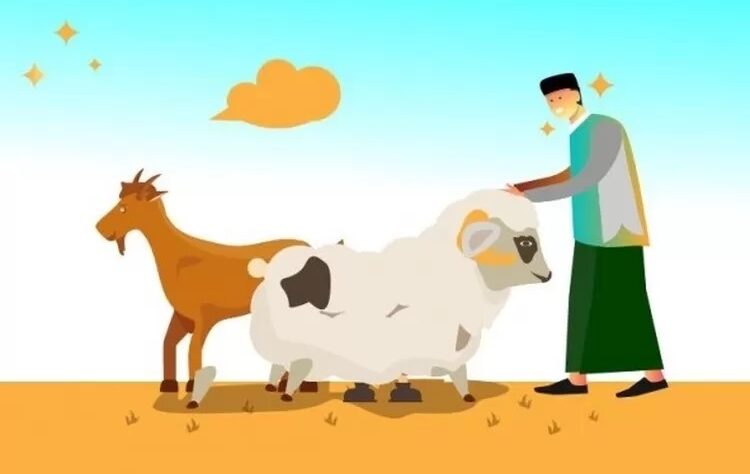Every year, Muslims around the world celebrate Eid al-Adha with echoes of takbir that echo from mosques, the aroma of sacrificial meat that is tempting in the kitchen, and hands that are busy wrapping meat to be distributed. But behind all that, Eid al -Adha is more than just an animal slaughter ritual. He is a mirror that reflects back a big question to us, that is the extent to which we are willing to sacrifice for something bigger than ourselves?
Eid al -Fitr, also known as the day of holiday sacrifice, referring to the story of the Prophet Ibrahim, who accepted God’s command to slaughter his son, Ismail because this story was not about blind cruelty or compliance, but about sincerity, absolute belief in God, and the desire to let go of what we love the most for better. And from here, sacrifice is no longer a problem of goats, cows, or sheep. Sacrifice is a symbol, and more, it is a very personal spiritual demand.
Today, we live in a very consumptive era. Everything is judged by how much we have, not how much we are going. Sometimes even worship is trapped in aesthetics showing off: sacrificial meat is photographed, distributed, decorated with a caption full of gratitude but without touching the core of the sincerity itself. Eid al-Adha should be a gentle slap that made us aware: Are we really sacrificing, or just slaughtering animals?
Also read: Choosing a Good Animal for Sacrifice
True sacrifice not only releases meat to be divided, but releases the ego to be addressed. Sacrifice is when we have to look in the mirror, ask: “What can I let go of this year to be closer to God? With others? With my own conscience?”

Perhaps our sacrifice this year is not a goat, but time. Release busy to meet parents, connect friendship, or get closer to children who we have only met on the sidelines of the work schedule. Or maybe our sacrifice is prestige: apologize to old friends, admit mistakes, or give a second chance to someone who has disappointed us. Sacrifice can be various forms, as long as accompanied by the intention to be better.
One of the most important dimensions of Eid al -Adha is solidarity. In Islam, sacrificial meat is not to be enjoyed by yourself. In fact, the suggestion of its division emphasizes that most of them are given to those in need. This is the spiritual power that transformed into a social movement.
Imagine if the spirit of Eid al -Adha was turned on for more than just three days of celebration. If we can share regularly, place empathy over the ego, and recognize that the rights of the poor are in our property perhaps social inequality will not be as bad as it is now.
But we also have to be honest: there is a time when the spirit of sharing turns into formality. The distribution of meat is done carelessly, without regard to who really needs. Some are in line, but go home empty -handed. There are also those who accept, but because “acquaintances” or “are used to being”. So, it is important for us to evaluate: whether this sacrifice is still about sincerity, or has been controlled by a blunt system?
In the midst of the boisterous celebration, we should set aside time to sit for a moment and reflect. Because of the truth, Eid al -Adha is also a moment of Tafakur. He is the right time to ask myself: “What have I sacrificed all this time? What am I alive? Am I alive for myself, or for something more meaningful?”
Also read: Improve the quality of faith from the sincerity of sacrifice
The story of Ibrahim and Ismail teaches that life is not always about having, but also about letting go. Releasing desires, letting go of fear, even let go of the things we love the most if it becomes a barrier towards goodness. This is a very relevant message, especially in an era where we are taught to always pursue, but rarely taught to give up.
If each Eid al -Adha only ends in the distribution of meat, then all that changes is the contents of the refrigerator. But if our Eid al -Adha lives as a soul revolution, then what changes is the way we look at life. We will be more easily grateful, lighter forgiveness, and dare to let go.
Imagine if everyone underwent Eid al -Adha with this understanding. More people who care about more solid people, and more just people. Sacrifice is not only strengthening our relationship with God, but also strengthens humanitarian nies that today are starting to loose.
The challenges of this era are not only a matter of economy, politics, or technology, but also about losing meaning. We need more than just celebration. We need spirituality that touches, awakens, and moves. Eid al-Adha gives us all that, if we want to stop for a moment, and really listen to the message brought by the story of Ibrahim and Ismail.
Also Read: Can Sacrifice Without Animals?
This year, let’s live Eid al -Adha not only with sharp knives to slaughter, but also with a sharp heart to understand. Because in the end, sacrifice is not about animals, but about the heart. Not about blood, but about love. Not about meat, but about caring. If we can realize all of that, then we have not only celebrated Eid al -Adha, but have also experienced Eid al -Adha in the deepest meaning.
Writer: trough
Editor: Rara Zaryry
Game Center
Game News
Review Film
Rumus Matematika
Anime Batch
Berita Terkini
Berita Terkini
Berita Terkini
Berita Terkini
review anime
